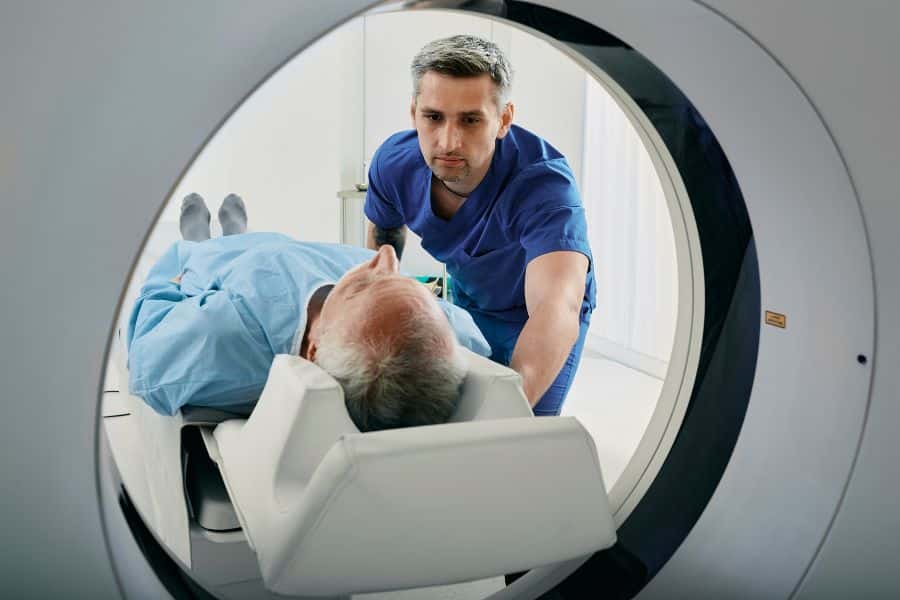When MRI's Are Not so Helpful

Many people assume that an MRI will accurately identify the cause of a patient’s pain and that surgically correcting that pathology will fix the patient’s symptoms. However, a lot of research has recently been emerging showing that a routine use of MRIs in non-operative or chronic pain situations is not recommended and in some cases, can negatively impact patient outcomes.
Abnormal MRI findings are very common, especially in aging patients. Some examples of abnormal MRI findings that are highly prevalent are disc degeneration in the spine, disc protrusion in the spine, rotator cuff and labral tears in the shoulder, and meniscus tears in the knee. The high occurrence of degenerative pathology in patients without symptoms (asymptomatic) tells us that these MRI findings may not be responsible for a lot of chronic pain symptoms.
These abnormal MRI findings used to be considered operative conditions, but research recently has shown that individuals with these conditions found on MRI can respond very well to conservative care, specifically physical therapy. Patients with back and leg pain with a herniated disc on MRI can be treated with active rehabilitation successfully without surgery in a majority of cases. Additionally, chronic rotator cuff and labral tears in shoulders can be managed with conservative treatment. Finally, older patients with degenerative meniscal tears can be treated with physical therapy successfully.
Some studies have shown that common surgeries used to treat shoulder impingement and knee meniscus tears are no better than placebo surgeries; this showed that the outcomes were the same regardless of whether or not the actual pathology was corrected surgically.
In most cases of chronic back, shoulder, or knee pain, MRI is unnecessary because non-operative care is usually successful, despite the MRI findings. Abnormal MRI findings can actually make recovery more difficult for patients, especially if the patient starts to assume that surgery is needed to fix their pathology. MRIs are generally only considered if at least a few months of conservative physical therapy are unsuccessful and if the patient is actually considering surgery.
There are of course times when an early MRI is the right choice. For example, when more recent significant trauma has occurred or concern for tumors or other more serious conditions is present, an MRI would be indicated early in the patient’s care. But in most cases, an MRI may be misleading and is usually unnecessary prior to starting physical therapy for chronic low back, shoulder, and knee pain.
Sources:
Pompan DC. Evidence against the routine use of MRI for nonoperative treatment of chronic orthopedic conditions. 2020.
Brinjikji W, Leutmer PH, Comstock B, et al. Systematic literature review of imaging features of spinal degeneration in asymptomatic populations. AJNR Am J Neuroradiol. 2015;36(4):811-816.
Schwartzberg R, Reuss BL, Burkhart BG, et al. High prevalence of superior labral tears diagnosed by MRI in middle-aged patients with asymptomatic shoulders. Orthop J Sports Med. 2016;4(1) ):2325967115623212.
Englund M, Guermazi A, Gale D, et al. Incidental meniscal findings on knee MRI in middle-aged and elderly persons. N Engl J Med. 2008;359(11):1108-1115.
Deshpande BR, Losina E, Smith SR, et al. Association of MRI findings and expert diagnosis of symptomatic meniscal tear among middle-aged and older adults with knee pain. BMC Musculoskelet Disord. 2016;17:154.
Gugliotta M, da Costa BR, Dabis E, et al. Surgical versus conservative treatment for lumbar disc herniation: a prospective cohort study. BMJ Open. 2016;6(12):e012938.
Kuhn JE, Dunn WR, Sanders R, et al. Effectiveness of physical therapy in treating atraumatic full-thickness rotator cuff tears: a multicenter prospective cohort study. J Shoulder Elbow Surg. 2013;22(10):1371-1379.
Mathew CJ, Lintner DM. Superior labral anterior to posterior tear management in athletes. Open Orthop J. 2018;12:303-313.
Kise NJ, Risberg MA, Stensrud S, et al. Exercise therapy versus arthroscopic partial meniscectomy for degenerative meniscal tear in middle aged patients: randomised controlled trial with two year follow-up. Br J Sports Med. 2016;50(23):1473-1480.
Beard DJ, Rees JL, Cook JA, et al. Arthroscopic subacromial decompression for subacromial shoulder pain (CSAW): a multicenter, pragmatic, parallel group, placebo-controlled, three-group, randomised surgical trial. Lancet. 2018;391(10118):329-338.
Sihvonen R, Paavola M, Malmivarra A, et al. Arthroscopic partial meniscectomy versus placebo surgery for a degenerative meniscus tear: a 2-year follow-up of the randomised controlled trial. Ann Rheum Dis. 2018;77(2):188-195.
